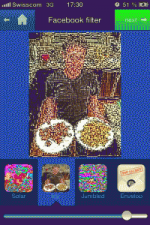
Blink and you’ll miss it. That’s the point of ephemeral messaging. But regardless of its brevity digital stuff that self-destructs is gaining in popularity. Witness the rise of Snapchat. Facebook also jumped aboard this bandwagon with its Snapchat clone competitor Poke. Well, here’s another to add to the perpetually vanishing pile: Secret.li is a free iOS app that lets users “timebomb” selected Facebook friends with photos that vanish after a pre-set interval, regardless of whether they have been viewed or not.
Secret.li says it stands apart from Snapchat by never storing any “clear” images — even for a brief time — on its network or on Facebook. Users choose a visual encryption style they want to apply to their photo allowing it to be partially or entirely disguised before the recipient chooses to view it. Viewing is done either via Secret.li’s iOS app or by downloading and installing its Facebook viewer plug-in.
The visual encryption filters have another role to play, as part of what Secret.li is hoping will be its special revenue-creating sauce. It reckons these filters will provide brands with attractive opportunities to tease followers with artfully masked imagery — to encourage them to view the full photo, which will presumably turn out to be some form of marketing or advertising. Social engineering is certainly one tried and tested way to trick get more people to look at ads online, since so many are tuning out visible ad-clutter.
Another difference between Secret.li and Snapchat/Poke is that its countdown to destruction starts the moment a photo is posted — not when the viewer starters to view it. Secret.li is also deliberately steering away from the hyper-ephemeral messaging furrow that Snapchat has been ploughing, and which has led to it be perceived as a teen sexting app (not that Snapchat agrees with that perception).
Secret.li’s self-destructing pre-set time intervals are either one hour, one day or one month — ergo, it’s hoping to keep things a lot cleaner than Snapchat, which lets snaps live for a fraction of that time, with the user choosing from one to 10 seconds. Secret.li’s thinking is clearly that the average sexter isn’t going to post a risqué image for a whole hour, when they can use Snapchat to send a shot for a second (exhibitionists may, however, prefer Secret.li’s staying power). Secret.li app users can also post photos from their gallery, not just shots they have snapped then and there.
Secret.li’s founders say they therefore expect it to appeal to a broader audience than other ephemeral messaging apps. Specifically they are targeting people who are concerned about the privacy implications of posting relatively innocuous photos (say, of them drinking or socialising) on Facebook and those shots then remaining there in perpetuity and coming back to haunt them at a later date.
“Snapchat is mainly used by teens for sharing a certain kind of content. The target audience of Secret.li is people of all ages who share photos on FB (sometimes reluctantly) and are worried that these will linger on forever,” it tells TechCrunch. “This is consistent with Secret.li’s timelines of 1 hour to 1 month. It gives these people an easier handle on managing their privacy.”
Its other target are those brands and celebrities who want to engage followers and fans by piquing their curiosity with the game of unwrapping a visual gift. “We can really see a huge benefit for brands and celebrities in using Secret.li. For household names, musicians and footballers, Secret.li offers a new way to engage on a personal basis with their fans by offering a sneak peak of their latest album cover, photo shoot or one from their everyday lives,” said founder Deepak Tewari in a statement. “The likes of Twitter and Instagram has brought fans closers to their idols and Secret.li fits in perfectly with this.”
Here’s an example of Secret.li’s visual encryption filters:
And here’s what Secret.li posts look like when they appear in the Facebook newsfeed — so before the viewer has clicked through to view them:
As well as ephemeral messaging apps like Snapchat, Secret.li taps into a wider trend for more circumscribed social sharing. There has been substantial growth in self-contained mobile messaging apps, for instance — whether it’s WhatsApp or WeChat or Line. These apps enable social sharing between a smaller group of friends who have a strong enough relationship to be contacts in each others’ phone books, rather than newsfeed-style broadcasts to huge numbers of ‘friends’ amassed on Facebook after years of use — many of whom may be more acquaintances than close friends.
Ephemeral sharing apps are also arguably helping to reinstate some of the social stratification that exists in and around friend groups and acquaintances IRL — subtle social divisions which services like Facebook either ignore or have been doing their best to dismantle for years.
Asked to describe the problem it’s attacking, Secret.li even invokes the phrase “right to be forgotten” — something the European Commission has been considering, as it works to reform data protection rules. ”Social network users share photos in a certain context and with a certain audience in mind. But with the sheer volumes of photos being shared and evolving relationships between people, both the context and intended audience is muddled. Privacy therefore becomes obscure helped in part by the complex and ever changing privacy policies of social networks,” it says.
“Secret.li is designed to put privacy control right back in the hands of the user and enforces the right to be digitally forgotten on each photo that is shared. It addresses the imbalance between publishing which is so easy and privacy which is so obscure.”
Secret.li’s founders say the app is also a way for them to test the market for “privacy centered applications” — a timely test, given the government spying web surveillance concerns du jour — noting they have “a roadmap of rich features” that might be implemented in future. They also note they might expand the platform beyond Facebook friend-related sharing in future.
When it comes to revenue generating, they say they see possibilites on both the consumer and b2b side of the Secret.li platform, adding that they might experiment with a freemium model. The Secret.li visually encrypted, eventually self-destructing experiment is being funded by OpenTV in Switzerland.



